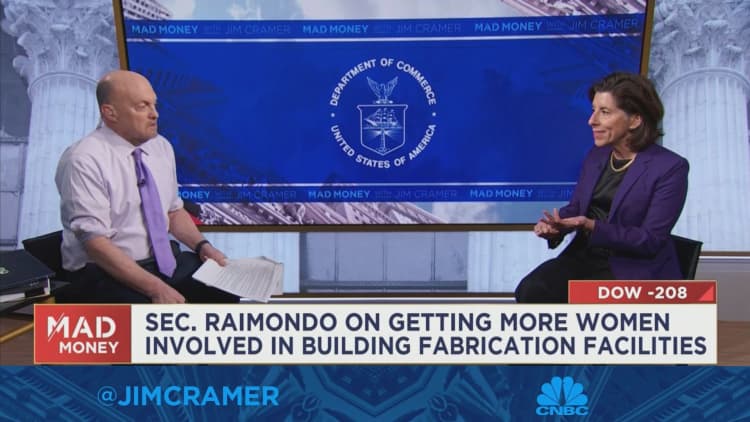

WASHINGTON — Commerce Secretary Gina Raimondo said Wednesday that the U.S. is considering collaborating with India on certain manufacturing jobs in order to boost competition against China.
Raimondo told Jim Cramer on CNBC’s “Mad Money” that she will visit India in March with a handful of U.S. CEOs to discuss an alliance between the two nations on manufacturing semiconductor chips. The Commerce Secretary also revisited some of President Joe Biden’s comments on American manufacturing from his State of the Union address on Tuesday.
“We stopped making things,” Raimondo said. “I think, in 1990, there were like 350,000 people working in the chip industry in America. Now it’s like 160,000.”
Biden’s CHIPS and Science Act, signed into law in August, supplied $52 billion for U.S. companies to invest in chip manufacturing. The U.S. semiconductor industry employed more than 277,000 workers in 2021, according to the Semiconductor Industry Association, but it made 0% of the world’s supply of semiconductors as of September 2022.
In comparison, Taiwan and South Korea comprise 80% of the global foundry market for chips. TSMC, the world’s most advanced chipmaker, is also headquartered in Taiwan. But a collaborative effort between the U.S. and the Indo-Pacific “quad” region could lessen the global reliance on Taiwanese semiconductors. In September 2021, India, Japan and Australia announced plans to establish a semiconductor supply chain initiative to secure access to semiconductors and their components.
Raimondo said that India is “making a lot of the right moves.”
“It’s a large population. (A) lot of workers, skilled workers, English speakers, a democratic country rule of law,” she said.
But the Commerce Secretary said the southeast Asian nation must comply with labor standards as part of any deal, especially in light of India’s consumption of Russian oil. The G-7 countries, Australia and the European Union have issued price caps on the cost of Russian oil products to restrict the Kremlin’s access to a potential funding source for its war on Ukraine while still maintaining an oil supply on the global market.
“I’m running the Indo-Pacific economic framework,” Raimondo said. “So we have 13 countries including India. And we’re saying to them, look, sign up at the government-to-government level to labor standards, environmental standards, anti-corruption standards, rule of law standards. And in return, it’ll unlock U.S. business, U.S. capital jobs in India.”
Raimondo also said she supports reinvesting the money from Biden’s 1% excise tax on stock buybacks for big businesses into the economy. Buybacks appeal to some of the nation’s largest investors and corporations.
“I’m strongly with the President that we ought to raise taxes on the wealthiest and on corporations close some loopholes and take that money and make investments,” she said. “You want women to go back to work? Childcare (has to) be provided, it’s too expensive. So, we need to raise taxes in some ways and then make investments to make the economy stronger.”


